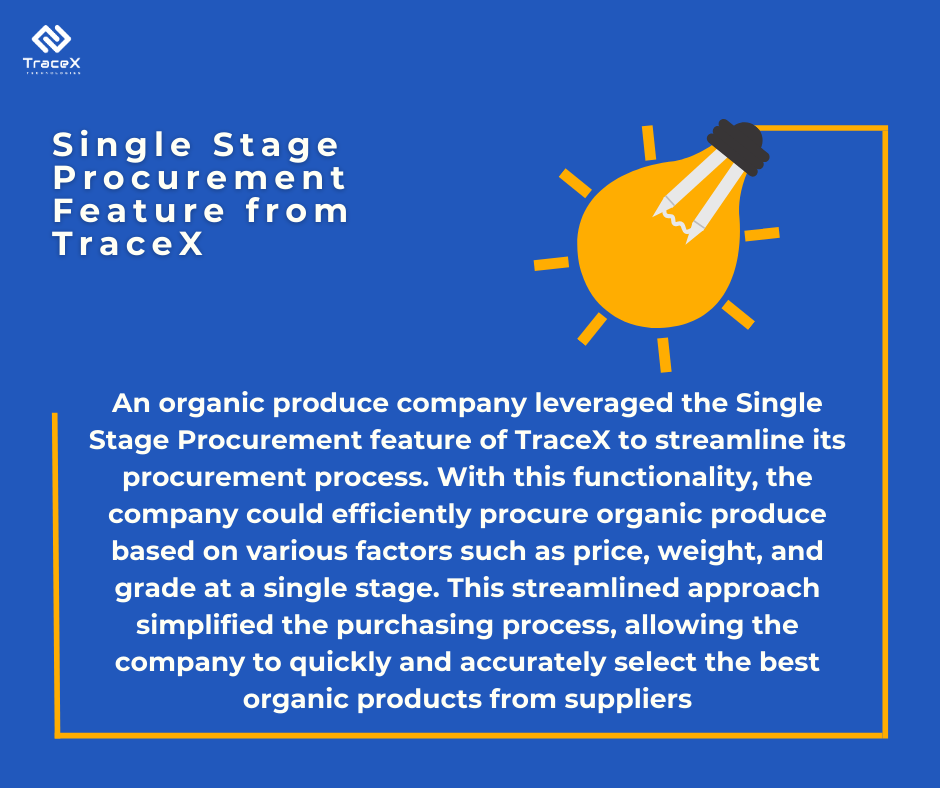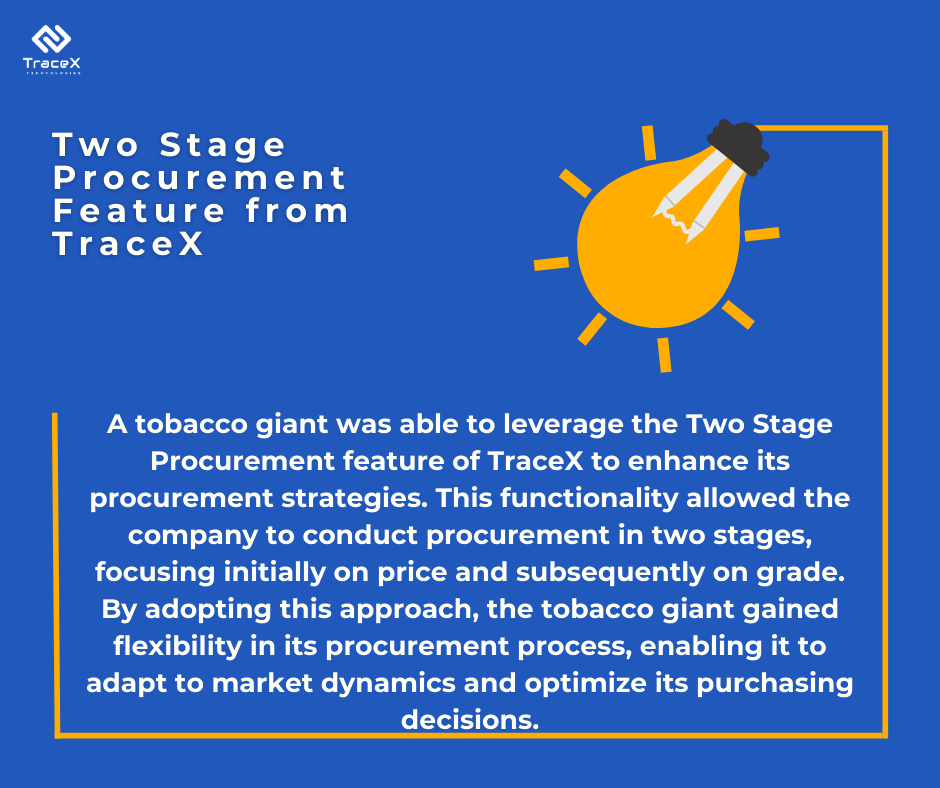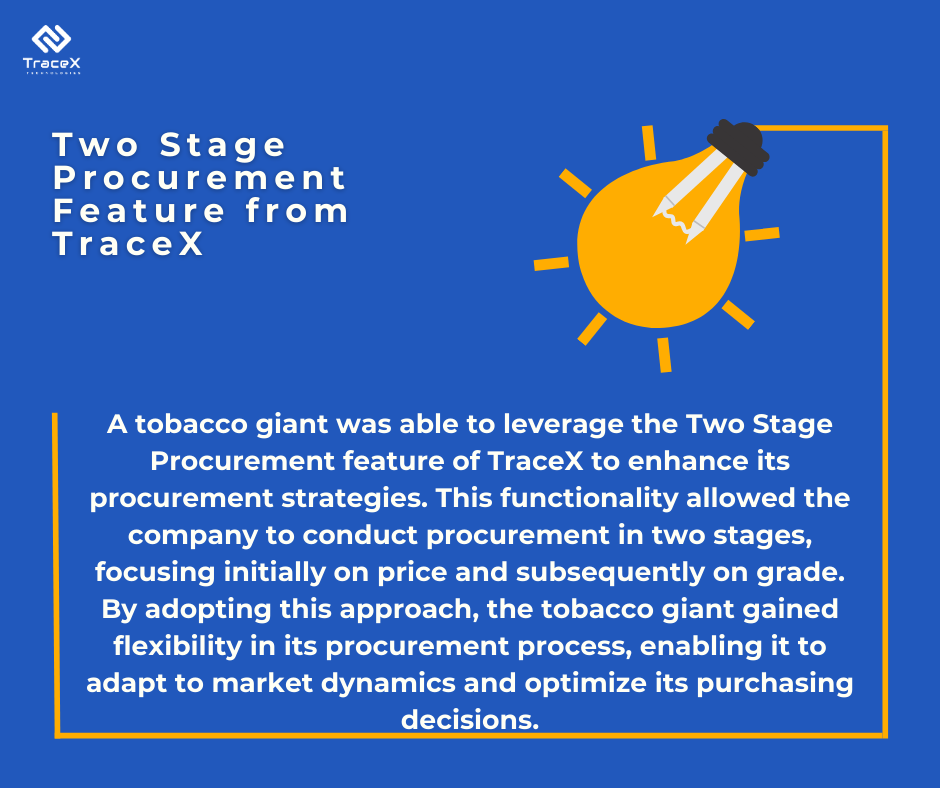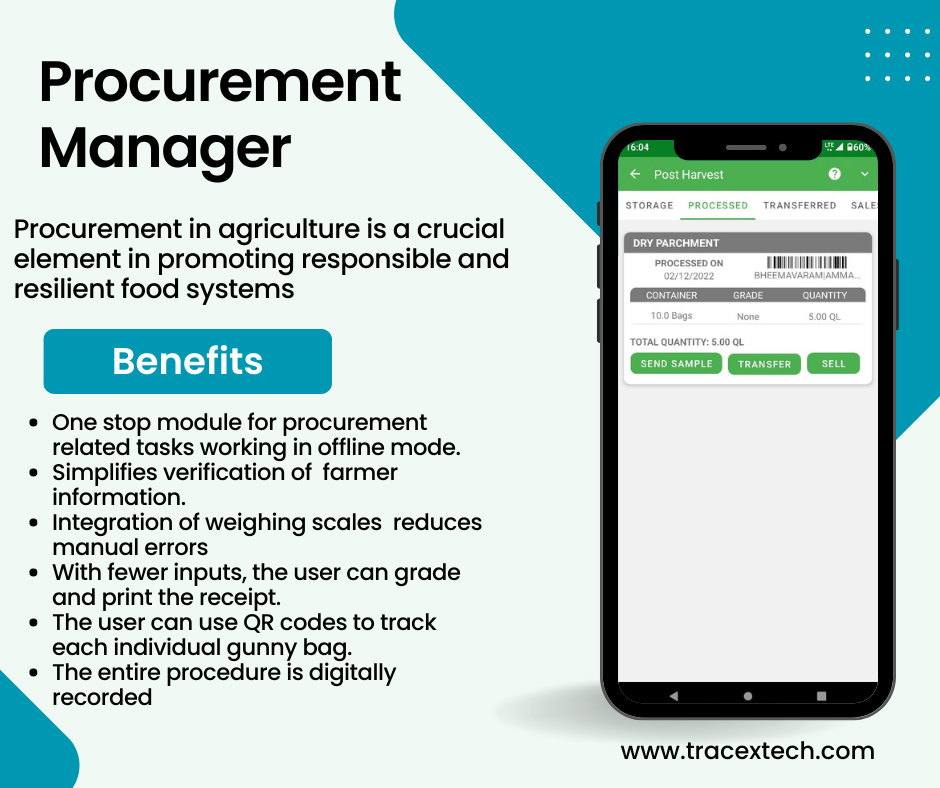Contact: +91 99725 24322 |
Menu
Menu
Quick summary: Discover the challenges faced in agribusiness procurement and how TraceX solutions can help. Streamline your procurement processes, enhance transparency, and overcome hurdles with our robust farm management solutions. Read more to optimize your agribusiness procurement today
Procurement in agriculture is very crucial in food security of the country and serves as a fundamental link between farmers and consumers. A good procurement system is also crucial to meet the needs of the market, provide a fair price to the cultivators and ensures transparency in transactions. However, this is not the case in most farming communities across the world. There are leakages in the system due to inefficient procurements systems, the proliferation of middlemen who contribute substantial quantities to the systems, which leads to the exclusion of small and marginal farmers, who are forced to sell below market price.
Procurement in agriculture encompasses the process of acquiring agricultural produce, including crops, livestock and other commodities from farmers or producers for further distribution, processing or retail.
Effective Procurement practices impact the overall supply chain, food security and sustainability of the agriculture industry.
Agribusiness procurement firms rely on steady, large-scale deliveries for profitability. Yet, they face challenges with fluctuating operational costs and perishable food quality. Meeting strict safety and quality standards is essential for delivering top-notch products. While implementing procurement solutions is complex, leveraging digital technologies offers the best path to enhance procurement practices.
A well -functioning procurement system ensures a reliable and consistent supply of high-quality produce, supporting fair pricing for farmers, enables value addition through processing and ensures availability of safe food to consumers. The increasing complexity of supply chains, the growing demand for transparency, ethical sourcing and sustainable practices has made procurement in agriculture to be a crucial element in promoting responsible and resilient food systems.
Meera adjusted her glasses, pinching the bridge of her nose in frustration. Spreadsheets filled her computer screen, each one a snapshot of a different farmer’s harvest. But the data only told part of the story. Meera, a procurement manager for a major food processing company, knew the real challenges lay beyond the numbers.
India’s agricultural landscape was a complex web of small, fragmented farms. Most farmers Meera dealt with were marginal – struggling to survive on plots of land barely two hectares. They lacked resources, battled declining land sizes, and often fell prey to unfair pricing thanks to a network of middlemen who acted as gatekeepers between farms and companies like hers.
Transparency? It was a distant dream. The lack of visibility into the supply chain meant quality control was a constant worry. Inefficient procurement systems led to “leakages” – money siphoned off before it reached the farmers’ pockets. Meera yearned for a system that ensured fair prices for the farmers who grew their food.
Communication was another hurdle. Farmers, scattered across vast regions, often lacked access to information about market fluctuations or company requirements. This led to missed opportunities and frustrated negotiations. On Meera’s end, the mountains of paperwork were a nightmare. Manual record-keeping was slow, prone to errors, and offered no traceability. Grading produce was a guessing game, impacting both safety standards and business relationships.
The decentralized nature of the system added another layer of complexity. Coordinating procurement across different locations felt like wrangling a herd of cats. The lack of real-time data meant Meera was constantly flying blind, unable to anticipate challenges or optimize processes.
Meera sighed, closing her laptop. The weight of these challenges pressed down on her. But amidst the frustration, a glimmer of hope flickered. New technologies were emerging, promising transparency and efficiency. Perhaps, just perhaps, there was a way to build a better future for both her company and the farmers who were the backbone of their industry.
Meera stared at the overflowing inbox, each email a new challenge: a farmer struggling with a surprise pest infestation, another worried about a delayed shipment due to a breakdown in communication. The dream of a streamlined procurement process seemed further away than ever. But then, during an industry conference, a presentation on TraceX solutions caught her eye.
The idea of a unified platform for communication resonated deeply. TraceX, she learned, could bridge the gap between her company and the farmers, facilitating clear and timely communication that could prevent misunderstandings and delays. Supplier onboarding, a tedious process choked with paperwork, could be streamlined. Finally, Meera could see a way to truly collaborate with the farmers who were the lifeblood of her business.
But TraceX offered more than just communication. The ability to track quality in real-time was a game-changer. Weather fluctuations and pests wouldn’t be a guessing game anymore. With TraceX, Meera could access pre-harvest data and accurate quality estimates, ensuring her company received the produce they needed.
E-procurement, another feature of TraceX, addressed another major concern: food safety standards. TraceX allowed Meera to monitor cultivation practices throughout the process, ensuring farmers adhered to strict regulations for export products. This not only guaranteed quality but also streamlined the export process by tackling compliance issues upfront.
As Meera delved deeper into TraceX, a spark of hope ignited. This wasn’t just software; it was a potential solution to the challenges that had plagued her for years. The promise of transparency, efficiency, and improved communication with farmers – it all seemed too good to be true. Yet, Meera knew she had to explore it further. Perhaps, TraceX was the key to finally building a sustainable and rewarding future for both her company and the farmers they relied on.
TraceX’s farm management solutions Trace Gro powered by blockchain provides the Procurement management feature that works in offline mode and benefits farmers and organizations.
Farmer verification is an essential step in agriculture procurement to ensure transparency, traceability and compliance.
Farmer identification ensures that the right individuals are engaged in procurement process and is authenticated with their phone numbers and Aadhar cards. This prevents frauds and ensures transparency. Validating land ownership is also crucial to prevent land disputes and ensure a legitimate process. Verifying farmer details includes validating their certifications to ensure that procured produce meets the required standards and meets the demands of conscious consumers.
Empower farmers, optimize resources, mitigate risks and achieve sustainability by integrating farmer profiling into your farm management practices.
Learn more
Procuring farmer’s produce efficiently is crucial for agri-commodity buyers and processors as it ensures a steady supply of high-quality agriculture products.
Unlocking efficiency and transparency, TraceX revolutionizes procurement operations from planning to execution.

Procurement Tokens are issued based on quality parameters configured in the system. Only after acceptance, the tokens are created. Farmers are notified with SMS on acceptance of their batches. The QR embedded token carries the information on the procurement activity of the farmer. The Procurement dashboard gives an insight into the procurement activities of the farmers , thereby facilitating seamless procurement.

Weighing of produce in procurement is crucial to ensure fair transactions and accurate payment. Weighing operations need to be efficient, accurate and have transparency.
Accuracy in weighing ensures that farmers receive fair compensation for their produce based on actual weight. It results in a trusted relationship between buyer and the farmer. Fair transactions promote a sustainable and equitable agriculture ecosystem. Farmers receive the right value for their hard work which contributes to their well-being and encourages continued involvement.
TraceX solutions provides blue tooth enabled weighing scale integration that streamlines the weighing process, saves time and increases efficiency. The traditional methods could be time-consuming and error prone. Large volumes of produce can be continuously weighed enhancing the operational efficiency. Automated systems reduce risks of manual data entry and provides greater accuracy. This results in transparency and reliability of the process.
Creation of pre-printed QR stickers eliminates unnecessary delays in printing and facilitates seamless procurement.
Dynamic QR Mapping for Traceability is a feature of TraceX that utilizes dynamic QR codes to enhance traceability and transparency in the supply chain. Unlike static QR codes, which contain fixed information, dynamic QR codes can be updated with real-time data. This allows for the mapping and tracing of the origin of procured products throughout the supply chain.
With this feature, companies can generate QR codes that dynamically link to detailed information about each product, such as its origin, production date, quality parameters, and journey through the supply chain. These QR codes can be scanned at various points along the supply chain, providing stakeholders with immediate access to up-to-date information about the product’s history and provenance.
Grading procured stock is crucial in agriculture to ensure quality standards, meet market requirements and enable fair pricing. The grading process assesses parameters such as size, colour, defect levels of commodities. Pricing lists are generated as per grades to ensure fairness.
The Market Price/Procurement Price feature in TraceX enables organizations to track market prices and set appropriate procurement prices for agricultural products. By leveraging real-time market data, companies can stay informed about fluctuations in commodity prices, allowing them to adjust their procurement strategies accordingly. This feature ensures that procurement prices are fair and reflective of current market conditions, facilitating transparent and equitable transactions between buyers and suppliers.
With the ability to monitor market prices, organizations can optimize their procurement decisions, such as determining when to buy and in what quantities. This helps them secure the best possible prices while also ensuring a steady supply of raw materials. Additionally, by setting fair procurement prices, companies can build trust and foster long-term relationships with their suppliers, promoting mutual benefit and sustainability throughout the supply chain.
The Custom Sales Receipts/SMS to Farmers feature in TraceX revolutionizes communication and transparency between procurement organizations and farmers. With this feature, companies can generate customized sales receipts directly from mobile devices or automate SMS notifications to farmers, providing them with detailed information about their transactions in real-time.
By offering custom sales receipts, procurement organizations can ensure that farmers have clear documentation of their sales, including product details, quantities, prices, and payment information. This not only enhances transparency but also helps farmers keep accurate records of their transactions for accounting and reporting purposes.
Moreover, automated SMS notifications serve as timely updates for farmers, informing them about the status of their sales, payment processing, or any other relevant information. This real-time communication fosters trust and collaboration between buyers and suppliers, reducing misunderstandings and improving overall satisfaction.


In conclusion, the adoption of TraceX Solutions in agricultural procurement represents a significant step towards enhancing efficiency, transparency, and sustainability in the agricultural supply chain. By leveraging advanced technology such as blockchain and dynamic QR mapping, TraceX Solutions empower organizations to streamline procurement processes, ensure fair transactions, and enhance traceability from farm to fork. With features like efficient planning, streamlined operations, and improved communication, TraceX Solutions enable agricultural stakeholders to overcome challenges, minimize risks, and drive positive outcomes for farmers, suppliers, and consumers alike. As we navigate the complexities of agricultural procurement, embracing innovative solutions like TraceX is crucial to achieving a more resilient, equitable, and prosperous agricultural sector for the future.
Agricultural procurement plays a critical role in ensuring food security, traceability, increased productivity, and transparency throughout the farm-to-fork value chain. Implementing an end-to-end procurement system ensures fair prices for farmers and reduces reliance on intermediaries.
